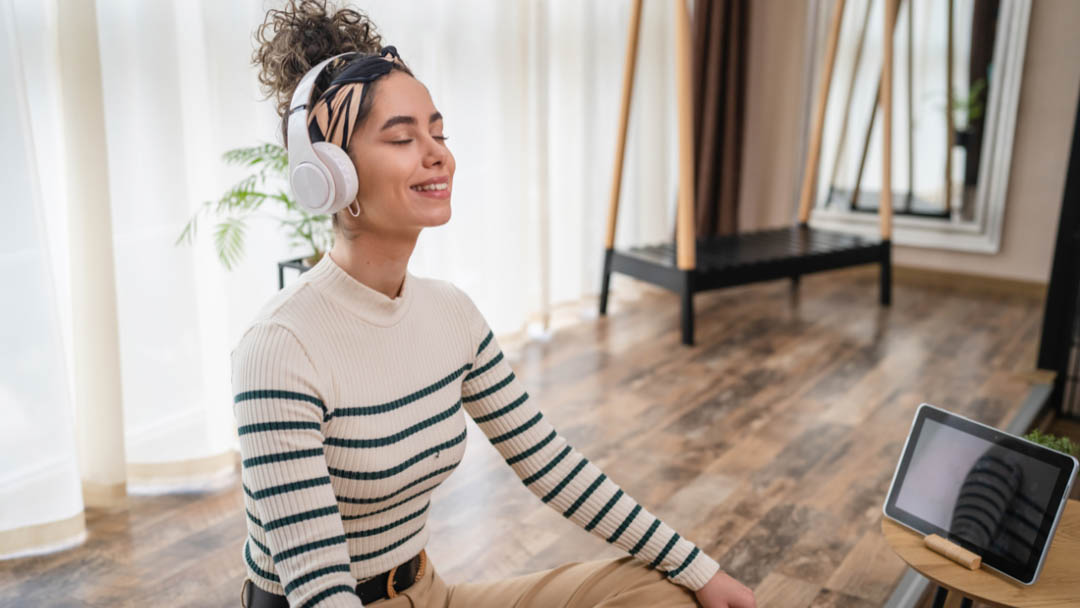Returning to school as a working adult can certainly pose its own challenges. From juggling jobs, school, and family to relearning how to be a student, it can be difficult to stay motivated and manage your time. It’s normal for some self-doubt, worry, and stress to creep in. And that doesn’t even take into account the added strain of what’s going on in the world around us.
That’s why mental health and self-care are so important for especially adult learners. You’ve probably seen the memes reminding you to secure your oxygen mask before assisting others. The idea is that you have to take care of yourself before you can be there for others. But how?
Self-care isn’t really about the massages, vacations, and cheesecake you might see across social media. It’s about making choices, creating healthy habits, and dedicating time to yourself. Here are some guidelines to help you get started on your self-care regimen.
Meet those basic needs
If you run in education circles, you may have heard about Maslow’s hierarchy of needs. The theory is that an individual must have their basic needs met before they can fulfill higher-level needs. Those foundational needs are physiological, such as food, shelter, and warmth.
The specifics of those needs don’t look the same for everyone. For example, some of us can function well on seven hours of sleep while others need nine. And some of us feel best when we work out rigorously four days a week whereas others are most energized by walking the dog or playing with our kids each day. Whatever works for you, make an effort to get sufficient rest, eat well, and be physically active so that you can feel your best as you juggle school, work, and downtime.
Take a break from technology
When it comes to well-being, Success Coach Rikki Scott suggests a little digital detox. For her, it’s about “putting my phone on ‘do not disturb’ and cooking, going for a walk with my dog, or reading a book uninterrupted.”
Taking your eyes off the screen has many benefits: you will likely sleep better, decrease stress, and increase your concentration. Many people have reported that breaking their phone or tablet habit has allowed them to immerse themselves more deeply in real life and improve their connections with friends and loved ones.
Placing your phone in another room while studying can help you improve your focus, reduce study time, and learn more effectively.
So try disabling notifications for all but the truly necessary apps on your phone, consider deleting social media from some of your devices, put your phone away during in-person conversations, and avoid looking at any screen for at least 30 minutes before bedtime. Take note of how it makes you feel and whether you see any difference in your relationships, your awareness of the world around you, and even your sleep patterns.
Try meditation
While you’ve stashed your phone away, consider practicing mindfulness by incorporating regular meditation into your life. And before you roll your eyes and click to another page, I promise that this is not about sitting on the floor with your legs crossed and emptying your mind of everything.
In fact, according to Jon Kabat-Zinn, the founder of mindfulness-based stress reduction (MSBR), meditation is about awareness. It involves paying attention to your breath so that you can stay truly in tune with the present moment without judgment.
How do you meditate?
- Set a timer that’s not too jarring for however long you want to practice; this can be as short as a minute and as long as you want.
- Find a comfortable place to sit quietly.
- Make sure you can sit in whatever position you choose for the entire time.
- Close your eyes if you like, or focus on a particular spot in front of you.
- Pay close attention to your breath as it flows in and out.
- When your mind inevitably wanders, that’s fine! Don’t give up, and don’t judge yourself. Just call your attention back to your breath.
- When the timer goes off, blink and keep your eyes open. Take note of your environment, your body, your thoughts, and your feelings.
That’s meditation in a nutshell. You’ll want to be intentional in setting aside time to do it regularly. It can take time to develop your practice, but be kind to yourself.
Meditation can help you lower stress, improve your focus, build patience for yourself and others, and connect more deeply with the world around you.
Practice self-compassion
Success Coach Rachael Wingfield suggests taking time-outs when you’re feeling especially tense or frustrated. “Pause on reactions when you recognize you are in stress mode,” she says, “and give yourself extra space to process. It can minimize a lot of unintended negative interactions, both personal and professional.”
Practice the Golden Rule and its converse: treat yourself as you would treat others.
And if you are stressed or anxious and then miss a meeting, earn a disappointing grade, or react angrily toward a friend or loved one, try not to let your inner critic take hold. Instead of beating yourself up about a mistake, recognize that you’re a human being. It’s OK to be upset or frustrated because that just means you’re being mindful of your feelings; in fact, it can help to name your feelings aloud to yourself or to journal about your emotions. But go further: extend to yourself the same kindness that you would give a friend or loved one. Take responsibility for the experience, learn from it, and move forward without punishing yourself so harshly.
Keep the big picture in mind
Self-care and mindfulness can help you prevent stress. But there will likely still be days when you’ll feel overwhelmed.
Success Coach Taylor Mechlinski recommends that you “take stock of what’s in your control and what isn’t” and then “focus on what is.”
For example, you may not be able to change that you have a major exam coming up, but you can control how (and how much) you study for it. You may not be excited about a specific class you have to take to fulfill your major or graduation requirements, but you can control your attitude toward that course. Being in a situation where you’re not in control of all the factors can be frustrating, but it’s also part of life. Again, acknowledge your feelings, but think creatively about how you might approach challenges differently.
When faced with a difficult or frustrating task you cannot change, reward yourself for meeting specific milestones to make that task easier to manage!
Set healthy boundaries
It’s easy to lapse into overwork as a working adult attending school. But by not overcommitting yourself, you’ll have more energy to achieve your goals.
This may mean taking only the number of classes that you can reasonably balance with work and family. It may mean taking a raincheck on dinner with friends so you can study or spend time with family. You may need to leave a party early so you can get to bed at a reasonable hour. Be intentional about how you manage your time, and communicate those needs to friends and loved ones.
And setting healthy boundaries isn’t being selfish; it’s about being mindful of your needs so you can put your best self forward as you juggle your priorities.
The benefits of self-care
Don’t apologize for protecting your mental health and well-being. By practicing self-care, you’re more likely to improve your performance at work and earn better grades at school. That’s partly because you’ll be preempting and reducing stress. Practicing self-compassion is also a major component of achieving work–school–life balance.
Ultimately, caring for yourself will ultimately allow you to care better for others—and achieve your personal, academic, and professional goals.
You don’t have to do this alone!
Make coaching part of your self-care routine. Your ReUp Success Coach is here to listen, providing the personalized guidance and empathetic support you need to achieve success as a working adult enrolled in school. Your support team is available by phone, text, or email. Ready to get started?



